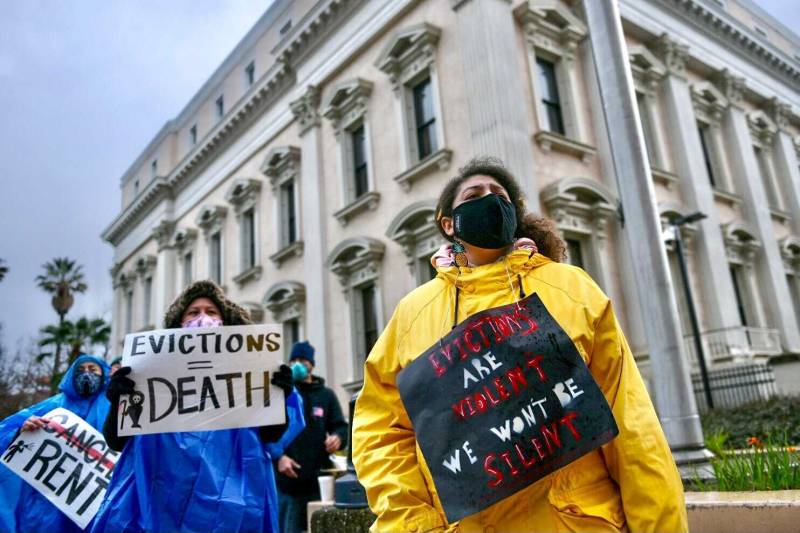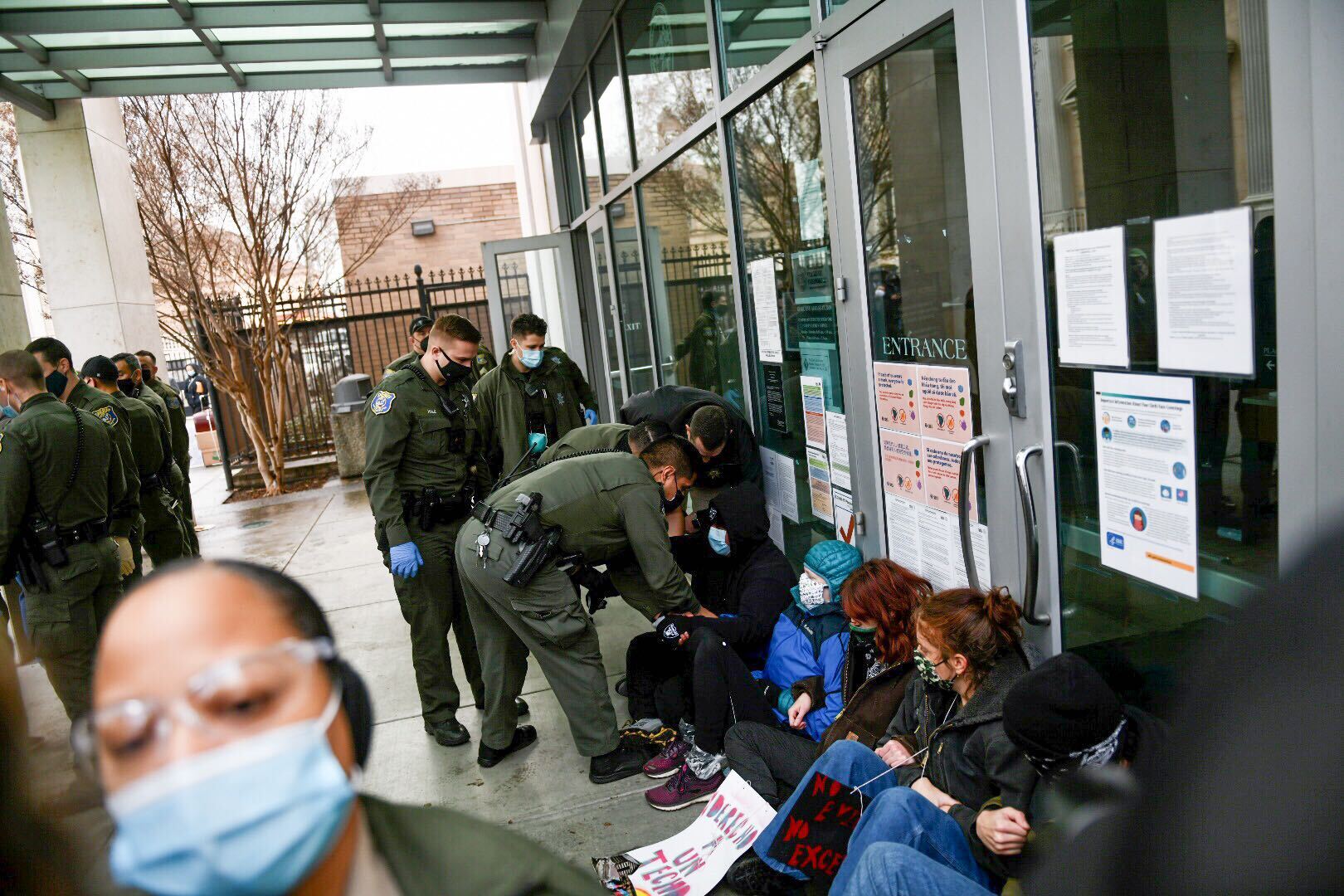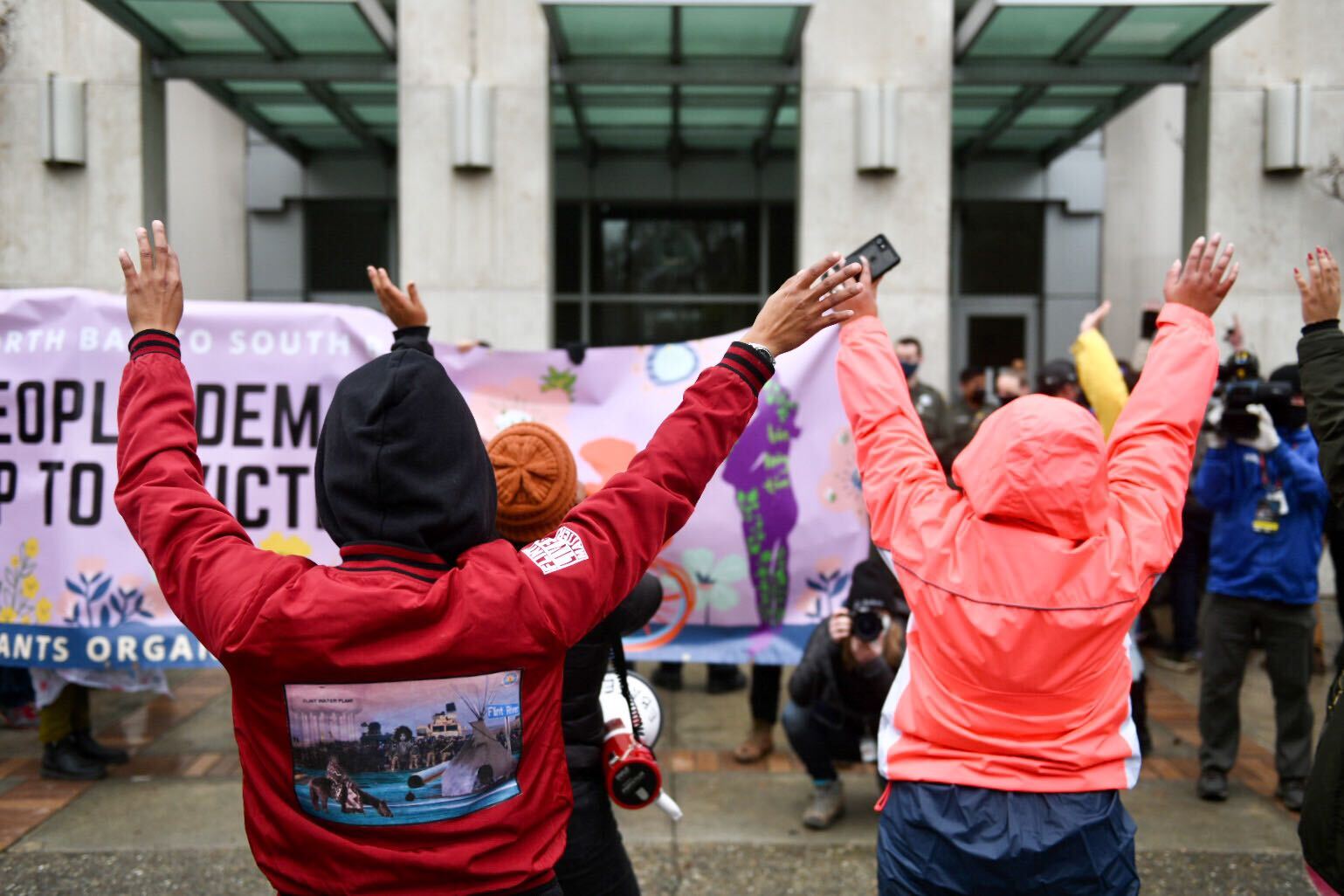Between 50 and 100 protesters gathered in front of the Santa Clara County Courthouse in San Jose on Wednesday morning, demanding stronger state and local eviction protections.
Protesters Block San Jose Courthouse in Demand for Stronger State Eviction Protections

Six demonstrators sat in front of the courthouse doors, their arms linked, to prevent people from entering.
Eduardo Torres was among those blocking the doors.
“I’m tired of seeing families being evicted,” he said, “especially during a pandemic. It’s really just heartbreaking.”
Torres, 42, is a tenants’ rights organizer. He says he’s frustrated with loopholes in state and local law that allow evictions to continue during the coronavirus pandemic, despite moratoriums designed to prevent them.
The courthouse remained closed through most of the morning as the protest continued. After several hours, Santa Clara County sheriff’s deputies removed the demonstrators who were blocking the doors, escorting them into the building in zip-tie handcuffs. Deputies then moved the remaining protestors out of the courtyard in front of the courthouse, which resulted in some scrimmages between law enforcement and protestors. Three other people were arrested, the sheriff’s office said.
“The vast majority of protestors appeared to be there for legitimate concerns, however there was a small group of individuals who were clearly there to incite violence and violate the Court Order,” Sgt. Michael Low, a spokesman for the Santa Clara County Sheriff’s Office, said in an email.

There were at least 527 evictions in the Bay Area from the start of the statewide coronavirus lockdown on March 19 through the end of December, according to data collected by KQED and CalMatters from sheriffs’ offices in the Bay Area’s nine counties.
At least 145 of those evictions — the most of any county in the region — took place in Santa Clara County. Tenants’ attorneys say that figure is an undercount, since most tenants leave or get locked out before law enforcement ever gets involved.

“We are here to demand from the sheriff no evictions during the pandemic,” said Betty Gabaldon, a tenant organizer. She called on Superior Court Judge Deborah Ryan to “halt all eviction proceedings during the pandemic, and for Gov. Gavin Newsom to pass a stronger eviction moratorium.”
In September, lawmakers approved Assembly Bill 3088, which prevents tenants impacted by the pandemic from being immediately evicted for non-payment of rent — a protection that expires on Jan. 31. On Monday, Newsom and key legislators introduced Senate Bill 91, which extends those protections through the end of June.
The new bill, like the previous one, requires tenants to continue paying at least 25% of their rent. It also permits evictions for various other reasons, including minor breaches of the lease, nuisance allegations, health and safety violations, and when properties are removed from the rental market.

Kevin Matthew O’Malley, 58, happened to be at the courthouse on Wednesday to fight his own eviction. He said he had gotten into an argument with his friend, who was letting him stay in an outbuilding on his property, and who now wants him gone. But O’Malley says he has nowhere to go.
“I’m homeless,” he said. “You’re kicking someone out during coronavirus. That should be a crime.”
A November study, still awaiting peer review, by UCLA’s Fielding School of Public Health, linked the lifting of eviction moratoriums in 27 states to 433,000 new COVID-19 cases and 11,000 deaths. The researchers attributed those cases to an increased spread of the virus, the result of people searching for new housing, doubling up with friends or family, or becoming homeless.
“Evictions are deadly,” Gabaldon, the tenant organizer, said. “They’re telling us to stay home to fight COVID, but how are we going to do it if they are kicking us out?”

SB 91 outlines a complex scheme for distributing $2.6 billion in federal stimulus funding for rental assistance. Under the proposal, landlords can receive 80% of unpaid back rent for low-income renters — but only if they agree to permanently forgive the remaining 20% and not pursue eviction.
If the landlord doesn’t agree, however, the tenant is on the hook for coming up with 75% of the back rent owed.
Assemblyman David Chiu, D-San Francisco, said he’s concerned about the ability of landlords to opt out of rent relief for their tenants.
“The power imbalance between tenants and landlords is real and it’s troubling,” he said.

Paul Barulich, a tax attorney who was watching the demonstration from the sidelines, said his hearing had been canceled.
“It throws all the people in the courtroom off,” Barulich said. “I get the passion. I just don’t know how effective that is.”
The demonstrators, however, declared the protest a victory.
